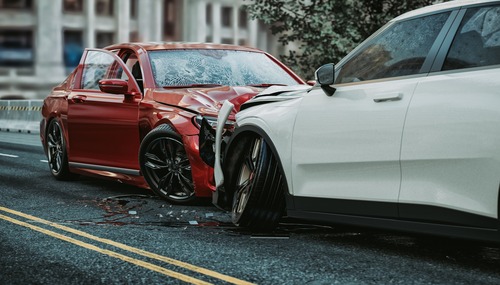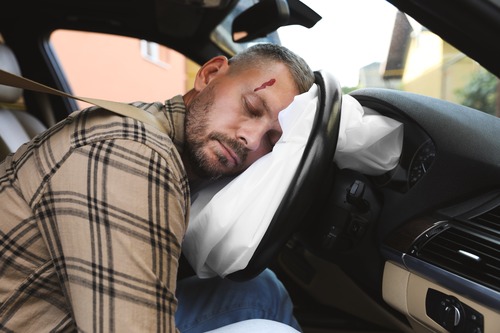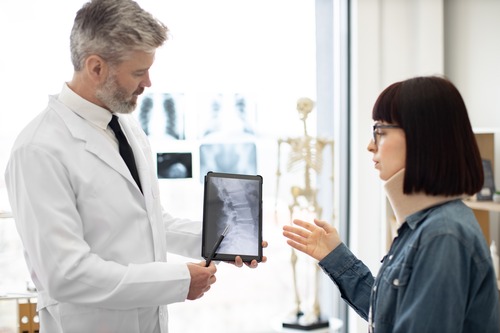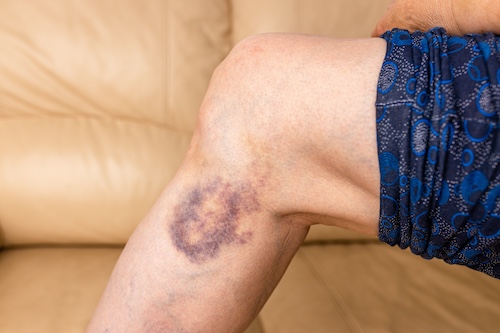At Georgia Spine & Orthopaedics, we are committed to providing comprehensive care for individuals recovering from car accidents. Our team of experienced specialists, including board-certified orthopedic surgeons, neurologists, and pain management experts, work together to treat both visible and hidden injuries caused by motor vehicle collisions. With multiple locations across the Atlanta metro area, we offer personalized treatment plans that combine orthopedic care, chiropractic services, and rehabilitation therapies.
Car accidents can lead to a range of injuries, many of which may not be immediately visible. While external injuries like cuts and bruises are easy to spot, internal injuries from a car accident can be much harder to detect and may worsen without proper treatment. Recognizing the signs of internal injuries after a car accident is crucial for ensuring prompt medical care and preventing long-term complications.
In this blog, we will explore the common internal injuries caused by car accidents, the symptoms to watch for, and why seeking treatment from an experienced Atlanta car accident doctor is essential for effective diagnosis and recovery.
Understanding Internal Injuries From A Car Accident
Internal injuries from a car accident can cause serious damage to the body, often going unnoticed at first. It is crucial to identify and treat these injuries promptly to avoid further harm.
What Are Internal Injuries?
Internal injuries refer to damage that occurs inside the body, typically affecting vital organs, blood vessels, or soft tissue. Unlike visible cuts or bruises, these injuries are not always immediately apparent and require careful medical evaluation to detect.
How Internal Injuries Happen
Internal injuries often occur in high-impact collisions, especially when blunt trauma or decelerating trauma causes the body to suddenly stop. Shear forces from the collision can stretch or tear tissues, leading to damage to organs, blood vessels, and internal structures. The sudden impact can also cause fractures in the rib cage, which may affect the lungs, liver, or spleen.
Common Types of Internal Injuries
Several internal injuries are common in car accidents. These include internal bleeding, damage to the spinal cord, traumatic brain injury, and injuries to internal organs like the liver, spleen, or kidneys. Ruptured organs and collapsed lungs are also risks. Depending on the severity, these injuries can lead to long-term complications, such as organ failure or severe blood loss.
Why Internal Injuries Are Often Not Immediately Apparent
The signs of internal injuries may not be obvious right after the accident. The body can often compensate for certain types of injuries, masking symptoms like internal bleeding or damage to organs. Severe pain or dizziness may appear only hours or days after the accident, which is why seeking immediate medical attention is essential, even if no obvious injuries are visible.
The Importance of Immediate Medical Attention
If internal injuries are left untreated, they can lead to life-threatening complications, including severe blood loss, organ failure, and spinal cord injuries. Surgical intervention may be required in severe cases to prevent further harm. Getting medical treatment quickly helps to reduce the risk of lasting consequences, such as permanent organ damage or disability.
The Most Common Internal Injuries Caused by Car Accidents
Car accidents can cause a variety of internal injuries. Some are more common than others, but all can have serious consequences if not treated quickly.
Traumatic Brain Injury (TBI)
A traumatic brain injury is one of the most serious internal injuries caused by car accidents. It occurs when the head is jolted or struck during a collision. Symptoms can range from confusion and headaches to loss of consciousness. Severe cases may lead to permanent brain damage or even death. Quick medical treatment is essential to reduce the risks associated with TBI.
Spinal Cord Injuries
The spinal cord is highly vulnerable during car accidents, particularly in high-impact collisions. Damage to the spinal cord can result in nerve damage, paralysis, and loss of sensation. Even minor spinal injuries can lead to long-term complications. Immediate medical attention is critical to limit the severity of these injuries.
Internal Bleeding
Internal bleeding occurs when blood vessels are damaged, often due to blunt trauma. This can happen in areas like the abdomen, chest, or pelvis. Without proper treatment, internal bleeding can lead to significant blood loss and even organ failure. Symptoms may include dizziness, low blood pressure, or abdominal pain. Seeking medical attention as soon as possible can prevent life-threatening consequences.
Organ Damage
Car accidents can lead to serious damage to vital organs such as the liver, spleen, or lungs. For example, a ruptured spleen may cause severe internal bleeding, while damage to the liver can result in long-term health problems. If these injuries are not addressed immediately, they can cause organ failure or other life-threatening conditions.
Rib Cage and Chest Injuries
In a high-speed car accident, the force of the collision can fracture the rib cage. Broken ribs can puncture the lungs, causing a collapsed lung, or damage to other internal organs like the heart or spleen. These injuries can result in severe pain and difficulty breathing, requiring emergency medical treatment to prevent further harm.
Abdominal Injuries
Abdominal pain after a car accident may be a sign of damage to internal organs such as the intestines, stomach, or kidneys. Blunt trauma to the abdomen can cause tears or ruptures in these organs, leading to internal bleeding or infection. Early detection and treatment are vital to prevent life-threatening complications.
Symptoms of Internal Injuries to Watch For
Internal injuries can be difficult to detect immediately after a car accident. Recognizing the symptoms early can prevent further harm and ensure prompt medical attention.
Chest Pain
Chest pain is a common symptom of internal injuries, especially if the rib cage or lungs have been damaged. A fractured rib can puncture the lungs, causing a collapsed lung. If the chest pain is severe or accompanied by difficulty breathing, it could indicate serious internal damage requiring urgent medical care.
Abdominal Pain
Pain in the abdomen can be a sign of internal organ damage, such as injury to the liver, spleen, or intestines. Blunt trauma to the abdomen may cause these organs to rupture or bleed internally. This pain may not always appear immediately, but it should be evaluated quickly to prevent further complications like internal bleeding or infection.
Severe Pain
Severe pain in any part of the body after a car accident can indicate internal injuries. This pain might be concentrated in the chest, abdomen, or back, and it can signal damage to vital organs or blood vessels. If pain persists or worsens over time, it is crucial to seek medical treatment as soon as possible.
Dizziness or Fainting
Dizziness or fainting can be symptoms of internal bleeding or low blood pressure resulting from a car accident. When blood vessels are damaged, it can lead to a significant loss of blood, causing a drop in blood pressure. These symptoms should never be ignored, as they can signal severe internal injury that requires immediate care.
Breathing Difficulty
Difficulty breathing can occur if there is damage to the lungs or rib cage. A collapsed lung or fractured ribs can make it hard to breathe deeply or normally. If this symptom develops after an accident, it is crucial to seek immediate medical attention to prevent further harm and complications.
Bruising or Swelling
While bruising and swelling are often external signs of injury, they can also indicate internal bleeding. Large or unexplained bruises, especially on the chest, abdomen, or back, may suggest damage to underlying organs or blood vessels. If bruising is severe or accompanied by other symptoms like pain or dizziness, it is important to seek medical care promptly.
Nausea or Vomiting
Nausea or vomiting after a car accident could signal damage to internal organs like the stomach or intestines. These symptoms may also appear if there is internal bleeding. If these symptoms occur with pain or swelling, they should be treated as potential signs of serious internal injuries.
The Role of Car Accident Doctors in Treating Internal Injuries
Car accident doctors play a key role in diagnosing and treating internal injuries after a motor vehicle accident. Their expertise helps patients recover from trauma and manage the long-term effects.
Comprehensive Medical Evaluation
At Georgia Spine & Orthopaedics, car accident doctors conduct detailed evaluations to identify hidden internal injuries. They use advanced diagnostic tools to detect damage to organs, internal bleeding, and spinal cord injuries, ensuring early intervention and proper treatment.
Personalized Treatment Plans
After diagnosing internal injuries, car accident doctors create personalized treatment plans. These plans may combine therapies like chiropractic care, pain management, and rehabilitation to treat both the injury and promote overall recovery, focusing on reducing pain and improving mobility.
Managing Soft Tissue Injuries
Many car accident victims experience soft tissue injuries, which can cause long-term pain if untreated. Car accident doctors at Georgia Spine & Orthopaedics specialize in managing these injuries through targeted treatments like spinal adjustments, helping alleviate pain and speed up recovery.
Pain Relief and Symptom Management
Car accident doctors focus on pain relief through non-invasive methods, including chiropractic adjustments and physical therapy. The goal is to reduce discomfort and improve functionality, preventing chronic pain or lasting disability.
Preventing Long-Term Complications
Early treatment by car accident doctors helps prevent severe complications, such as organ failure or spinal cord injuries. Their continuous care reduces the risk of lasting damage and ensures proper healing of internal injuries.
Collaborating with Specialists
For more severe injuries, car accident doctors work with specialists to provide comprehensive care. They ensure that any surgical intervention or additional treatment is coordinated for the best patient outcome.
Ongoing Support and Rehabilitation
Car accident doctors provide ongoing rehabilitation to help patients regain strength and mobility after treatment. Regular follow-ups ensure progress is monitored and treatment plans are adjusted as needed for full recovery.
Seek Treatment From an Experienced Atlanta Car Accident Doctor ASAP!
If you’ve been involved in a car accident and are experiencing any symptoms of internal injuries, it’s crucial to seek medical attention as soon as possible. Early detection and treatment can make a significant difference in your recovery and prevent long-term complications. At Georgia Spine & Orthopaedics, our team of experienced Atlanta car accident doctors specializes in diagnosing and treating a wide range of internal injuries.
Schedule an appointment with us today at 678-929-4494!








